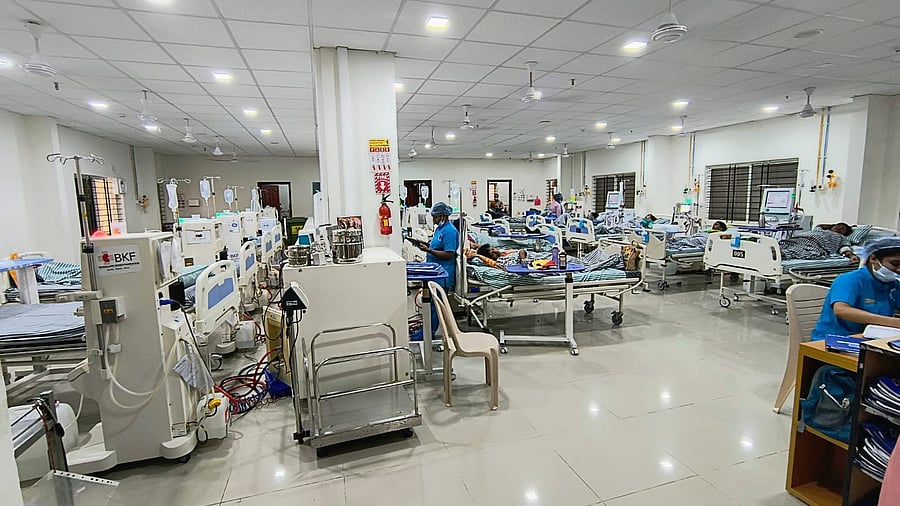
Credit: Special Arrangement
Lalitha’s profile picture shows the 48-year-old receiving her certificate after completing a walkathon. Listening to her describe her routine of a morning walk, yoga and household chores, you would think it is the tale of a regular homemaker who takes her fitness seriously. But Lalitha’s tale is anything but regular. It is one of grit and hope, of facing challenges head-on and overcoming them.
“I was 38 when I was hospitalised for an unexplained fever. Many investigations later, I was told that I have chronic kidney disease (CKD). The doctors advised dialysis.” A scared Lalitha tried alternative forms of medicine.
Finally, when she realised that dialysis was the only option, she went to Bangalore Kidney Foundation (BKF), where she has been receiving free dialysis twice a week.
BKF has been a well-known name in kidney care since its inception in 1979. Its services, especially for the underprivileged, have won the organisation several accolades. “In the year 2023 itself, BKF has offered over 44,000 sessions of dialysis, out of which 45% were free and another 30% were given at subsidised rates. The remaining 25% were paid for,” says P Sriram, 82, chairman of the charitable trust. Sriram is a man on a mission — to do everything possible to support those with kidney diseases.
“This is a ‘raja khayile’, a disease of the rich - treatment for which only the affluent can afford,” says Prasad, who receives dialysis three times a week. “It is only because of BKF that we are able to afford this life-saving treatment,” he adds.
It is not just the cost of dialysis; patients need other medicines, regular lab tests and nutritious meals. Prasad, for instance, was 27 when a snake bite damaged his kidneys irreversibly. Travelling from Kadur to Bengaluru thrice a week since 2008, he has not let kidney failure come in the way of having as full a life as possible.
“This is our objective, that patients lead a normal life. Some of our patients return to work, the majority carry on with their domestic functions. Sickness and hospitalisations have come down drastically because they undergo regular dialysis,” says Sriram.
Over time, it became clear that women kidney patients were especially vulnerable. The economic burden of dialysis means that even when dialysis is free, women are unable to afford quality nutrition which is essential. “We then started the ‘total care’ scheme, where along with dialysis, protein and vitamin supplements, lab investigations and rations for a family of four are provided free of cost,” says Sriram.
BKF also runs a separate wing for women undergoing dialysis. This wing has been functioning since 2016 and is much appreciated by the patients and their families.
The money for the initiative comes from donors and patients who pay. Fundraiser events such as music concerts and memorial lectures are organised to help raise awareness.
A committed team
Volunteers work tirelessly to raise funds and ensure smooth functioning of BKF. Gurunath is one such volunteer. After his retirement, he wanted to give back to society. Seeing people with CKD lose their lives or suffer because families could not afford treatment costs, he put his time and effort into fundraising. “Many corporates have donated generously. The number of patients we cater to has grown manifold,” says Gurunath.
Some time later, Gurunath himself was diagnosed with end-stage renal disease (ESRD). He is now undergoing dialysis. He laughs away the irony, saying, “Perhaps it was God’s way of preparing me for this.” Undeterred, Gurunath continues with his current mission of public education.
Dr Dinesh Kumar, a senior nephrologist, is also on the team at BKF. "India is the diabetes capital of the world. Diabetes, hypertension and chronic heart conditions among younger people have resulted in the increase of ESRD. To effectively manage these health challenges, it is crucial to have preventive measures and continuous monitoring of kidney functions,” he explains. He also suggests embracing healthier lifestyles from an early age to minimise these risk factors.
Seeing patients travel anywhere between 50 to 400 km for dialysis, BKF has started 17 dialysis centres in rural areas like Chikkanayakanahalli in Tumakuru, where local hospitals perform free dialysis in collaboration with the foundation. BKF plans to start an affordable transplant centre in Bengaluru soon.